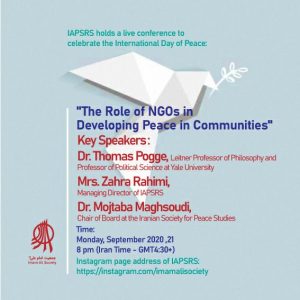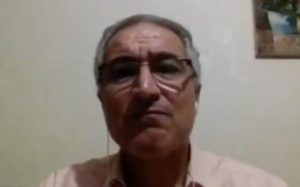The Role of NGOs in Developing Peace in Communities
- Imam Ali Society holds a live conference to celebrate the International Day of Peace:
“The Role of NGOs in Developing Peace in Communities”
Time:
Tuesday, September 22, 2020
8 pm (Iran Time – GMT+4:30)
Key Speakers:
Dr. Thomas Pogge, Leitner Professor of Philosophy and Professor of Political Science at Yale University
Mrs. Zahra Rahimi, Managing Director of Imam Ali Society
Dr. Mojtaba Maghsoudi, Chair of Board at the Iranian Society for Peace Studies
Instagram page address of Imam Ali Society:
https://instagram.com/imamalisociety
Key Speakers:
- Thomas Pogge, Leitner Professor of Philosophy and Professor of Political Science at Yale University
- Zahra Rahimi, Managing Director of Imam Ali Society
- Mojtaba Maghsoudi, Chair of Board at the Iranian Society for Peace Studies
The highlights of Dr. Pogge Speeches:
- The speech centers around peace and the dimensions from which peace is defined.
- Firstly, Dr. Pogge gave standard definition of peace which is a condition of a social system in which conflicting claims among its participants are effectively resolved through rule-based and rule-governed procedures, without resort to violence or the threat of violence and then explained that how peace is achieved through rule-governed and rule-based procedures. After providing a paradigm example for elaborating the given definition the lecture goes on and brings up “genuine peace and Modus Vivendi” as two kinds of peace and then this point is emphasized that the latter is prevalent at the international level.
- Prudence is mentioned as the most significant feature of Modus vivendi as it is applied by the involved parties to secure their interests and minimize the possible threats and vulnerabilities.
- In Flexible Equibrium participants who become stronger press for changes that make the rules more favorable to themselves. Those who become weaker will accept such changes in order to ensure the continued compliance of the stronger
- It is also cited that how the term prudence can weaken the weak parties and strengthen the strong ones. The term spiral is stated to explain the aforementioned situation. It is further expressed that how Modus vivendi turns the peace treaty into a battle of survival for the involved parties and how values are undermined to keep power as it is the most crucial matter in Modus vivendi.
- It is therefore concluded that a genuine peace cannot be achieved through Modus vivendi regardless of how long it can be kept. It is noted that the aptness of shifting in military, economic, and soft power is imminent because power-seeking states intend to keep their interests at any cost.
- When a country has a genuine peace: violence and threats of violence are no longer significant sources of political influence. Economic inequality is moderate and no longer a major source of political dominance. Religious and other communities enjoy freedom to organize themselves securely. The government and state agencies are led and staffed by officials who are loyal to the whole nation and its shared values
Dr. Thomas Pogge’ Speech, Leitner Professor of Philosophy and Professor of Political Philosophy at Yale University On the occasion of World Peace Day
The highlights of Dr. Maghsoudi’s Speech:
- Positive peace can be viewed from different dimensions; social justice, job security, having humanitarian concerns at different levels of society.
- Imam Ali Society is active in various social areas, including environmental, legal, etc… This NGO has not limited itself geographically to the capital city and with the minimum financial resources have been able to expand the geographical scope of its activities to the farthest parts of the country.
- NGOs are effective in establishing and maintaining peace because they come from the heart of societies. They have wholeheartedly touched the problems of the poor and the low-income. As a result, these institutions make peace their first priority and logically represent the interests of people.
- The formation and presence of these organizations is spontaneous and voluntary.
- Civic institutions contribute to peace in terms of vitality. They always have positive aspirations. They are a source of joy and hope. Hope brings peace.
- NGOs play preventive roles in the concentration of power in countries because there is no concentration of power in their structure. There is a democratic mechanism in the structure of these organizations and the existence of this democratic structure along with elections are the basis for peace because interactive platforms create peace.
- Non-governmental organizations distribute the available facilities fairly. These institutions have a wide capacity in the field of distributive justice. They help all deprived areas and play a significant role in empowering the vulnerable. Sustainable peace is established through distributive justice, and because it is voluntary, it does not jeopardize others’ situation.
- Another positive feature of NGOs is that they operate without ideology. Their activities revolve around health, education, the environment, and there are no racial or ethnic boundaries.
- Utilizing international capacities is another feature of these organizations. The use of global experience brings a kind of pragmatism, and this expansion of communication increases the capacity for positive peace.
- Women make up 25 to 30 percent of these institutions. The widespread presence of women who are inherently motherly and nonviolent contributes to peace.
- These organizations do not pursue special financial interests. They are professional and agile. In the event of a flood, earthquake or conflict, these institutions reach the affected areas sooner and do not require a bureaucratic process like government institutions. Most of the activities of these institutions are defined in the field of peace.
- These institutions operate in other areas such as health, awareness and education, security, cultural development, history, and their presence can certainly strengthen the foundations of governments
The highlights of Mrs. Rahimi’s Speech:
- The digital definition of peace is the absence of war. Like zero and one . Either we are or we are not.
- New definition of peace: In the absence of war, we address the issue of the quality of peace in society
- Material and spiritual inequalities must be considered in measuring the quality of peace in a society
- Spiritual inequality is the root of material inequality, and in its absence, we do not achieve peace
- One of the reasons for the lack of peace is the existence of injustice.
- Our NGO has been working on justice from the beginning. Educational justice, spiritual justice, and giving a sense of security to affected children
- One of the most important indicators of peace is the recognition of ethnic diversity and differences
- These indicators distinguish human beings
- There are wars around the world for more resources. Governments have a hardware role to play in stopping war. The soft power to stop war is in the hands of the people
- In the definition of new peace or positive peace, there is the concept of going from the part to the whole and vice versa. There is peace in me and I can give it to the world around me. Or there is peace in the world around me and I enjoy it.
- Our organization promotes peace in the houses of science, which are located in the suburbs. We can turn all contradictions into love and interaction in one small space. Peace modeling is effective in spreading peace. In our educational centers, valuations are in the form of differences
- According to Mr. Meymandinejad, the founder of Imam Ali Society, special attention should be paid to affected children and women, and the reason is that one of the characteristics of the lack of peace is that there is an injured and damaged child in the society. According to Mr. Meymandinejad, this is one of the biggest threats to peace. Sharmin says “our role models for peace are children because we have experienced in our houses of science that children tended to play when they were alone”. Sharmin sees the game as peace. According to him, playing game moves towards unity. There is not much profit or loss in children’s play. Children unite and create a world in which there is no war. We can make peace by following the example of children. Sharmin says “the house of God is a house where injured children gather. We will eliminate social inequality by establishing these houses where injured children are gathered. As a result, children help us to return to our inner peace”.
On international day of peace, 21th of September 2020, this meeting held by Imam Ali Popular Students Relief Society, IAPSRS, one of the major volunteer-based NGOs in Iran with more than 20 years in operation. IAPSRS is the only NGO in Iran that is granted general consultative status to the United Nations ECOSOC, it currently provides vital support to over 6800 individuals, and already saved 50 children and juveniles from execution.
On June 21, 2020, Mr. Sharmin Meymandinejad, founder of IAPSRS, has been arrested, and he is still detained, without receiving any formal charges.







Leave a Reply
Want to join the discussion?Feel free to contribute!